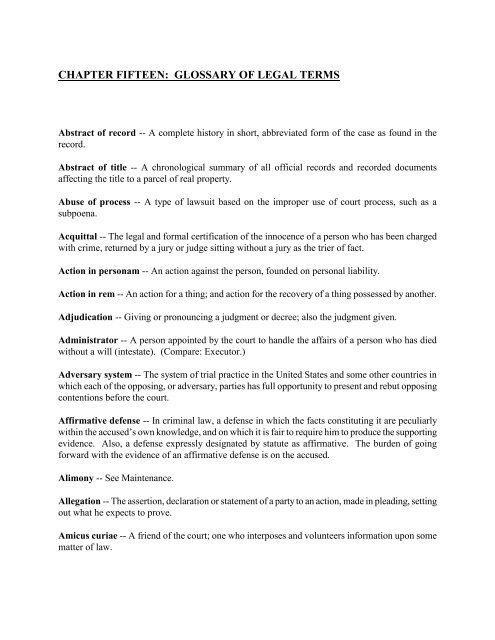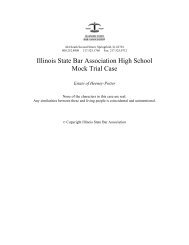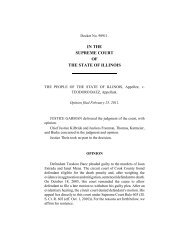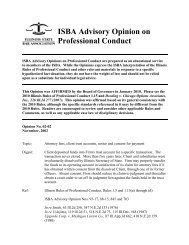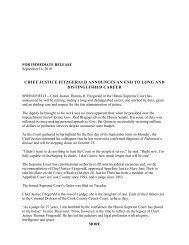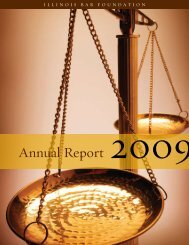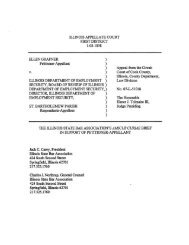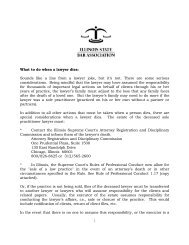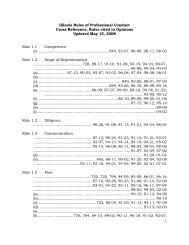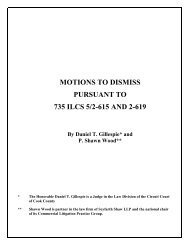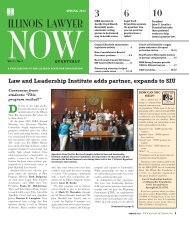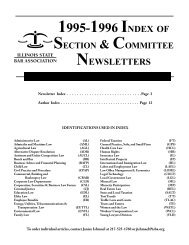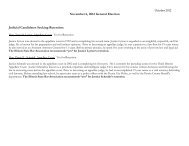chapter 15: glossary of legal terms - Illinois State Bar Association
chapter 15: glossary of legal terms - Illinois State Bar Association
chapter 15: glossary of legal terms - Illinois State Bar Association
Create successful ePaper yourself
Turn your PDF publications into a flip-book with our unique Google optimized e-Paper software.
CHAPTER FIFTEEN: GLOSSARY OF LEGAL TERMS<br />
Abstract <strong>of</strong> record -- A complete history in short, abbreviated form <strong>of</strong> the case as found in the<br />
record.<br />
Abstract <strong>of</strong> title -- A chronological summary <strong>of</strong> all <strong>of</strong>ficial records and recorded documents<br />
affecting the title to a parcel <strong>of</strong> real property.<br />
Abuse <strong>of</strong> process -- A type <strong>of</strong> lawsuit based on the improper use <strong>of</strong> court process, such as a<br />
subpoena.<br />
Acquittal -- The <strong>legal</strong> and formal certification <strong>of</strong> the innocence <strong>of</strong> a person who has been charged<br />
with crime, returned by a jury or judge sitting without a jury as the trier <strong>of</strong> fact.<br />
Action in personam -- An action against the person, founded on personal liability.<br />
Action in rem -- An action for a thing; and action for the recovery <strong>of</strong> a thing possessed by another.<br />
Adjudication -- Giving or pronouncing a judgment or decree; also the judgment given.<br />
Administrator -- A person appointed by the court to handle the affairs <strong>of</strong> a person who has died<br />
without a will (intestate). (Compare: Executor.)<br />
Adversary system -- The system <strong>of</strong> trial practice in the United <strong>State</strong>s and some other countries in<br />
which each <strong>of</strong> the opposing, or adversary, parties has full opportunity to present and rebut opposing<br />
contentions before the court.<br />
Affirmative defense -- In criminal law, a defense in which the facts constituting it are peculiarly<br />
within the accused’s own knowledge, and on which it is fair to require him to produce the supporting<br />
evidence. Also, a defense expressly designated by statute as affirmative. The burden <strong>of</strong> going<br />
forward with the evidence <strong>of</strong> an affirmative defense is on the accused.<br />
Alimony -- See Maintenance.<br />
Allegation -- The assertion, declaration or statement <strong>of</strong> a party to an action, made in pleading, setting<br />
out what he expects to prove.<br />
Amicus curiae -- A friend <strong>of</strong> the court; one who interposes and volunteers information upon some<br />
matter <strong>of</strong> law.
Ancillary bill or suit -- One growing out <strong>of</strong> and auxiliary to another action or suit, such as a<br />
proceeding for the enforcement <strong>of</strong> a judgment, or to set aside fraudulent transfer <strong>of</strong> property.<br />
Annulment -- A declaration <strong>of</strong> invalidity <strong>of</strong> a marriage in which the court finds a marriage does not<br />
properly exist.<br />
Answer -- A pleading by which a defendant responds to the plaintiff's allegation <strong>of</strong> facts.<br />
Appearance -- The formal proceeding by which defendant submits himself to the jurisdiction <strong>of</strong> the<br />
court.<br />
Appellant -- The party appealing a decision or judgment to a higher court.<br />
Appellate court -- A court having jurisdiction <strong>of</strong> appeal and review; not a “trial court.”<br />
Appellee -- The party against whom an appeal is taken; generally, the party who won in the lower<br />
court.<br />
Arraignment -- In criminal practice, to bring a prisoner to the bar <strong>of</strong> the court to answer to a<br />
criminal charge.<br />
Arrest <strong>of</strong> judgment -- The act <strong>of</strong> staying the effect <strong>of</strong> a judgment already entered.<br />
Attachment -- A remedy by which plaintiff is enabled to acquire a lien upon property or effects <strong>of</strong><br />
defendant.<br />
Attorney <strong>of</strong> record -- Attorney whose name appears in the permanent records or files <strong>of</strong> a case.<br />
Bail -- To set at liberty a person arrested or imprisoned, on security being taken, for his appearance<br />
on a specified day and place.<br />
Bond -- An obligation signed by the accused, with sureties, to secure his presence in court.<br />
Bailiff -- A court attendant whose duties are to keep order in the courtroom and to have custody <strong>of</strong><br />
the jury.<br />
Banc -- Bench; the place where a court permanently or regularly sits. A sitting “en banc” is meeting<br />
<strong>of</strong> all the judges <strong>of</strong> a court, as distinguished from the sitting <strong>of</strong> a single judge or panel <strong>of</strong> judges.<br />
Battery -- A type <strong>of</strong> lawsuit or criminal <strong>of</strong>fense based on a actual physical violence, whether serious<br />
or minor, inflicted by the defendant on the plaintiff. A battery is the result <strong>of</strong> an assault, which is<br />
really an attempted battery.
Bench warrant -- Process issued by the court itself, or “from the bench” for the attachment or arrest<br />
<strong>of</strong> a person.<br />
Best evidence -- Primary evidence, as distinguished from secondary; the best and highest evidence<br />
<strong>of</strong> which the nature <strong>of</strong> the case is susceptible.<br />
Beyond a reasonable doubt -- The highest degree <strong>of</strong> pro<strong>of</strong>, required to establish guilt in a criminal<br />
case.<br />
Bill <strong>of</strong> particulars -- A written statement by a prosecuting attorney specifying the details <strong>of</strong> a crime<br />
with which an accused is formally charged, such as the exact time, location, etc.<br />
Binding instruction -- One in which the jury is told if they find certain conditions to be true they<br />
must find for plaintiff, or defendant, as the case may be.<br />
Bind over -- To hold on bail for trial.<br />
Blotter -- Record kept at a police station <strong>of</strong> the first encounter <strong>of</strong> police with a crime or suspected<br />
crime.<br />
Booking -- A police administrative action <strong>of</strong>ficially recording an arrest and identifying the person,<br />
the place, the time, the authority, and the reason for the arrest.<br />
Brief -- A document prepared by counsel to file in court, usually setting forth both facts and <strong>legal</strong><br />
arguments in support <strong>of</strong> his case.<br />
Burden <strong>of</strong> pro<strong>of</strong> -- In the law <strong>of</strong> evidence, the necessity or duty <strong>of</strong> affirmatively proving a fact or<br />
facts in dispute.<br />
Capital <strong>of</strong>fense -- A felony for which the death penalty may be imposed.<br />
Caption -- The heading or introductory clause which shows the names <strong>of</strong> the parties, name <strong>of</strong> the<br />
court, number <strong>of</strong> the case, etc.<br />
Cash bond -- A type <strong>of</strong> bail in which the accused in a criminal case deposits with the court the full<br />
amount <strong>of</strong> his bail in cash. The entire amount is refundable if he appears when required.<br />
Cause <strong>of</strong> action -- The <strong>legal</strong> basis for a lawsuit.<br />
Certiorari -- An original writ commanding judges or <strong>of</strong>ficers <strong>of</strong> inferior courts to certify or to return<br />
records <strong>of</strong> proceedings in a case for judicial review. This term is used to apply to most requests for<br />
review by the U.S. Supreme Court.
Chambers -- Private <strong>of</strong>fice or room <strong>of</strong> a judge.<br />
Change <strong>of</strong> venue -- The removal <strong>of</strong> a suit begun in one county or district to another, for trial, or<br />
from one court to another in the same county or district.<br />
Charge -- The judge’s instructions to the jury on its duties, and on the law involved in the case and<br />
how it must be applied. The charge is always given just before the jury retires to consider its verdict.<br />
Also, “charge” is <strong>of</strong>ten used to mean an accusation in a criminal case.<br />
Circuit courts -- In <strong>Illinois</strong>, the court <strong>of</strong> general jurisdiction or trial-level court.<br />
Circumstantial evidence -- All evidence <strong>of</strong> an indirect nature; the process <strong>of</strong> decision by which a<br />
court or jury may establish a fact by inference from circumstances known or provided.<br />
Citation -- A form <strong>of</strong> combined complaint and summons that may be used in minor criminal cases.<br />
A traffic ticket is a form <strong>of</strong> citation. Also, the means <strong>of</strong> referring to published court decisions or<br />
other <strong>legal</strong> materials by book and page number.<br />
Civil action -- A lawsuit based on a private wrong, as distinguished from a crime, or to enforce<br />
rights through remedies <strong>of</strong> a private or non-penal nature. All <strong>legal</strong> proceedings that are not criminal<br />
actions are civil actions.<br />
Code -- A collection, compendium or revision <strong>of</strong> laws systematically arranged into <strong>chapter</strong>s, table <strong>of</strong><br />
contents and index and promulgated by legislative authority.<br />
Codicil -- A supplement or an addition to a will.<br />
Commit -- To send a person to prison, to an asylum, workhouse or reformatory by lawful authority.<br />
Common law – “Judge-made” law that has developed from court decisions based on customs and<br />
precedents; distinct from laws enacted by legislatures and written in statutes and codes.<br />
Commutation -- The change <strong>of</strong> a punishment from a greater degree to a lesser degree, as from death<br />
to life imprisonment.<br />
Comparative negligence -- The doctrine by which one person’s negligence is compared to another's,<br />
measured in <strong>terms</strong> <strong>of</strong> percentage. Any damages allowed are diminished in proportion to the amount<br />
<strong>of</strong> negligence attributable to the person seeking recovery.<br />
Competency -- In the law <strong>of</strong> evidence, the presence <strong>of</strong> those characteristics which render a witness<br />
<strong>legal</strong>ly fit and qualified to give testimony, or which renders a criminal defendant fit to stand trial.<br />
Complainant -- Synonymous with “plaintiff.”
Complaint -- The first pleading on the part <strong>of</strong> the plaintiff in a civil action.<br />
Concurrent sentence -- Sentences for more than one crime in which the time <strong>of</strong> each is to be served<br />
at the same time, rather than consecutively (See below).<br />
Condemnation -- The <strong>legal</strong> process by which real estate <strong>of</strong> a private owner is taken for public use<br />
without his consent, upon the award and payment <strong>of</strong> just compensation.<br />
Consecutive sentence -- Separate sentences (each additional to the other) imposed against a<br />
convicted person; one sentence to begin at the expiration <strong>of</strong> another.<br />
Contempt <strong>of</strong> court -- Any act calculated to embarrass, hinder or obstruct a court in the<br />
administration <strong>of</strong> justice, or calculated to lessen its authority or dignity. Contempts are <strong>of</strong> two kinds:<br />
direct and indirect. Direct contempts are those committed in the immediate presence <strong>of</strong> the court;<br />
indirect is the term chiefly used with reference to the failure or refusal to obey a lawful order.<br />
Continuance -- A postponement granted by a court in a <strong>legal</strong> proceeding. Under present practice, a<br />
continuance may only be granted for good cause, such as the illness <strong>of</strong> counsel or a party, or the<br />
unavailability <strong>of</strong> a witness.<br />
Controlling case -- A prior appellate court opinion which, by reason <strong>of</strong> its <strong>legal</strong> analysis or facts, is<br />
so similar to current case as to constitute a precedent.<br />
Corpus delicti -- The body (material substance) upon which a crime has been committed, e.g., the<br />
corpse <strong>of</strong> a murdered man, the charred remains <strong>of</strong> a burned house.<br />
Corroborating evidence -- Evidence supplementary to that already given and tending to strengthen<br />
or confirm it.<br />
Court reporter -- A person who transcribes by shorthand or stenographically takes down testimony<br />
during court proceedings.<br />
Cost -- An allowance for expenses in prosecuting or defending a suit. Ordinarily this does not<br />
include attorney's fees.<br />
Counterclaim -- A claim presented by a defendant in opposition to the claim <strong>of</strong> a plaintiff.<br />
Courts <strong>of</strong> record -- Those whose proceedings are permanently recorded and which have the power<br />
to fine or imprison for contempt. Courts not <strong>of</strong> record are those <strong>of</strong> lesser authority whose<br />
proceedings are not permanently recorded.<br />
Criminal insanity -- Lack <strong>of</strong> mental capacity to do or abstain from doing a particular act; inability to
distinguish right from wrong.<br />
Cross-examination -- The questioning <strong>of</strong> a witness in a trial or deposition by the party opposed to<br />
the one who produced the witness.<br />
Damages -- Compensation which may be recovered in court by any person who has suffered loss,<br />
detriment or injury to his person, property or rights, though the unlawful act or negligence <strong>of</strong> another.<br />
De Novo -- Anew, afresh. A “trial de novo” is the retrial <strong>of</strong> a case.<br />
Declaratory judgment -- One which declares the rights <strong>of</strong> the parties or expresses the opinion <strong>of</strong> the<br />
court on a question <strong>of</strong> law, without ordering anything to be done.<br />
Decree -- A decision or order <strong>of</strong> the court. A final decree is one which fully and finally disposes <strong>of</strong><br />
the litigation; an interlocutory degree is a provisional or preliminary decree which is not final.<br />
Defamation -- Injuring a person's character or reputation by false statements.<br />
Default -- A “default” occurs when a defendant fails to answer a civil complaint within the time<br />
allowed or fails to appear at the trial.<br />
Degree <strong>of</strong> pro<strong>of</strong> -- The degree <strong>of</strong> pro<strong>of</strong> by which a case or defense must be established. The degree<br />
<strong>of</strong> pro<strong>of</strong> required to establish guilt in a criminal case is beyond a reasonable doubt. The degree <strong>of</strong><br />
pro<strong>of</strong> necessary to permit an extraordinary remedy in a civil case is clear and convincing evidence<br />
(extraordinary remedies include most remedies other than money damages, such as an injunction).<br />
The degree <strong>of</strong> pro<strong>of</strong> required to prevail in other civil cases is a preponderance <strong>of</strong> the evidence. A<br />
lesser degree <strong>of</strong> pro<strong>of</strong> required to make a valid arrest or hold a criminal accused for trial is probable<br />
cause.<br />
Demur -- To file a pleading (called “a demurrer”), admitting they are <strong>legal</strong>ly insufficient.<br />
Deposition -- The testimony <strong>of</strong> a witness not taken in open court, by authority <strong>of</strong> statute or court<br />
rule.<br />
Determinate sentencing -- A sentence <strong>of</strong> imprisonment for a specific or definite rather than for a<br />
minimum and maximum term.<br />
Direct evidence -- Pro<strong>of</strong> <strong>of</strong> facts by a witness who saw acts done or heard words spoken, as<br />
distinguished from circumstantial evidence, which is called indirect.<br />
Direct examination -- The first interrogation <strong>of</strong> a witness by the party on whose behalf he is called.
Directed verdict -- An order by the judge (based upon an essential weakness <strong>of</strong> the prosecution’s<br />
case) that the jury must find that the defendant was not proved guilty beyond a reasonable doubt.<br />
Discovery -- Process by which one party in a <strong>legal</strong> action seeks to determine the evidence in<br />
possession <strong>of</strong> the other side that could affect the outcome <strong>of</strong> the case. Usually occurs before trial.<br />
(See: Deposition and Interrogatories.)<br />
Dismissal without prejudice -- Permits the complainant to sue again on the same cause <strong>of</strong> action.<br />
Dismissal “with prejudice” bars the right to refile an action on the same claim or cause.<br />
Dissent -- A term commonly used to denote the disagreement <strong>of</strong> one or more judges <strong>of</strong> a court with<br />
the decision <strong>of</strong> the majority.<br />
Dissolution <strong>of</strong> marriage -- In <strong>Illinois</strong>, a type <strong>of</strong> <strong>legal</strong> proceeding in which a marriage is dissolved<br />
when the complaining party establishes one <strong>of</strong> nine grounds for dissolutionment. (Previously called<br />
a divorce.) (See: Grounds for dissolution.)<br />
Divorce -- See: Dissolution <strong>of</strong> marriage.<br />
Docket -- Court record in which cases are listed or formally entered.<br />
Domicile -- The place where a person has his true and permanent home. A person may have several<br />
residences, but only one domicile.<br />
Double jeopardy -- Common-law and constitutional prohibition against prosecuting a person more<br />
than once for the same crime, transaction or omission.<br />
Due process -- Law in its regular course <strong>of</strong> administration through the courts <strong>of</strong> justice. The<br />
constitutional guarantee <strong>of</strong> due process requires that every person have the protection <strong>of</strong> a fair trial.<br />
DUI -- Driving while under the influence <strong>of</strong> alcohol, other drug, or combination). <strong>Illinois</strong> law that<br />
prohibits a person from driving or being in actual control <strong>of</strong> any vehicle while: (1) the alcohol<br />
concentration in the person's blood or breath is 0.10 or more; (2) under the influence <strong>of</strong> alcohol; (3)<br />
under the influence <strong>of</strong> any other drug or combination <strong>of</strong> drugs to a degree that renders the person<br />
incapable <strong>of</strong> driving safely.<br />
Embezzlement -- The fraudulent appropriation by a person to his own use or benefit <strong>of</strong> property or<br />
money entrusted to him by another.<br />
Eminent domain -- The power to take private property for public use by condemnation. See<br />
Condemnation.<br />
Enjoin -- To require a person, by writ <strong>of</strong> injunction from a court <strong>of</strong> equity, to perform or to abstain
or desist from some act.<br />
Entrapment -- The act <strong>of</strong> <strong>of</strong>ficers or agents <strong>of</strong> a government in inducing a person to commit a crime<br />
not contemplated by him, for the purpose <strong>of</strong> instituting a criminal prosecution against him.<br />
Equitable action -- An action which may be brought to restrain the threatened infliction <strong>of</strong> wrongs<br />
or injuries. (Remedies not available at common law.)<br />
Escheat -- In American law, the right <strong>of</strong> the state to an estate to which no one is able to make a valid<br />
claim.<br />
Escrow -- A writing, or deed, delivered by the grantor into the hands <strong>of</strong> a third person, to be held by<br />
the latter until the happening <strong>of</strong> a contingency or performance <strong>of</strong> a condition.<br />
Estoppel -- A person's own act, or acceptance <strong>of</strong> facts, which preclude his later making claims to the<br />
contrary.<br />
Et al -- An abbreviation <strong>of</strong> et alii, meaning “and others.”<br />
Et seq. -- An abbreviation for et sequens, or et sequential, “And the following.”<br />
Evidence -- Anything tending to prove a fact, or disprove an alleged fact. Some <strong>of</strong> the more<br />
important classes <strong>of</strong> evidence are: (1) testimony; (2) physical evidence, or things which have a<br />
tangible existence; (3) documentary evidence which includes a wide range <strong>of</strong> letters, memoranda, or<br />
other writings; and (4) demonstrative evidence, in which a procedure, cause, effect, or event is<br />
shown or acted out. See also circumstantial evidence and direct evidence.<br />
Exclusionary rule -- Judge-made doctrine that evidence il<strong>legal</strong>ly obtained cannot be used to convict<br />
a person <strong>of</strong> a crime. (See: Suppression <strong>of</strong> Evidence.)<br />
Ex parte (ex par'te) -- By or for one party; done for, in behalf <strong>of</strong> or on the application <strong>of</strong> one party<br />
only.<br />
Ex post facto (ex post fak'to) -- After the fact; an act or fact occurring after some previous act or<br />
fact, and relating thereto.<br />
Ex rel. – “In behalf <strong>of</strong>.”<br />
Exception -- A formal objection to an action <strong>of</strong> the court during the trial <strong>of</strong> a cause, in refusing a<br />
request or overruling an objection; implying that the party excepting does not acquiesce in the<br />
decision <strong>of</strong> the court, but will seek to procure its reversal.<br />
Executor -- A person designated in a will or appointed by the court to carry out the directions <strong>of</strong> the
will. (Compare: Administrator)<br />
Exhibit -- A paper, document or other article produced and exhibited to a court during a trial or<br />
hearing.<br />
Expert evidence -- Testimony given in relation to some scientific, technical or pr<strong>of</strong>essional matter<br />
by experts, i.e., persons qualified to speak authoritatively by reason <strong>of</strong> their special training, skill or<br />
familiarity with the subject.<br />
Extenuating circumstances -- Circumstances which render a crime less aggravated, heinous or<br />
reprehensible that it would otherwise be.<br />
Extradition -- The surrender by one state to another <strong>of</strong> an individual accused or convicted <strong>of</strong> an<br />
<strong>of</strong>fense outside its own territory, and within the territorial jurisdiction <strong>of</strong> the other.<br />
Extraordinary writ -- Any <strong>of</strong> five special types <strong>of</strong> lawsuits which can be brought originally only in<br />
a court <strong>of</strong> jurisdiction: habeas corpus, mandamus, procedendo, prohibition and quo warranto.<br />
Fair preponderance -- Evidence sufficient to create in the minds <strong>of</strong> the triers <strong>of</strong> fact the conviction<br />
that the party upon whom the burden is placed has established its case.<br />
False arrest -- Any unlawful physical restraint <strong>of</strong> another's liberty, whether in prison or elsewhere.<br />
False pretenses -- Designed misrepresentation <strong>of</strong> existing fact or condition whereby a person obtains<br />
another’s money or goods.<br />
Felony -- A crime <strong>of</strong> a graver nature that a misdemeanor. Generally, an <strong>of</strong>fense punishable by<br />
imprisonment in a penitentiary or death.<br />
Fiduciary -- A term derived from the Roman law meaning a person holding the character <strong>of</strong> a<br />
trustee, in respect to the trust and confidence involved in it and the scrupulous good faith and candor<br />
which it requires.<br />
Forcible entry and detainer -- A proceeding for restoring possession <strong>of</strong> land to one who has been<br />
wrongfully deprived <strong>of</strong> possession.<br />
Forgery -- The false making or material altering, with intent to defraud, <strong>of</strong> any writing which, if<br />
genuine, might be the foundation <strong>of</strong> <strong>legal</strong> liability.<br />
Fraud -- An intentional perversion <strong>of</strong> truth; deceitful practice or device resorted to with intent to<br />
deprive another <strong>of</strong> property or other rights, or in some manner to do him injury.<br />
Garnishment -- A proceeding whereby property, money or credits <strong>of</strong> a debtor in possession <strong>of</strong>
another (the garnishee) are applied to the debts <strong>of</strong> the debtor.<br />
Garnishee (noun) -- The person upon whom a garnishment is served, usually a debtor <strong>of</strong> the<br />
defendant in the action; (verb) to institute garnishment proceedings.<br />
Good time -- Time awarded an inmate to diminish a prison sentence in return for good behavior.<br />
Grand jury -- A jury whose duty is to receive complaints and accusations in criminal cases, hear the<br />
evidence and find bills <strong>of</strong> indictment in cases where they are satisfied a trial ought to be had. The<br />
size <strong>of</strong> the jury (16 in <strong>Illinois</strong>) is set by law.<br />
Gratuitous guest -- In automobile law, a person riding at the invitation <strong>of</strong> the owner <strong>of</strong> a vehicle, or<br />
his authorized agent, without payment <strong>of</strong> consideration or a fare.<br />
Grounds for dissolution <strong>of</strong> marriage -- The nine grounds for dissolution <strong>of</strong> marriage in <strong>Illinois</strong> are:<br />
extreme physical or mental cruelty; desertion (one year or more); adultery; impotence at time <strong>of</strong><br />
marriage; prior existing marriage; habitual drunkenness or drug abuse; attempt to take spouse's life;<br />
conviction <strong>of</strong> a felony; and infection <strong>of</strong> spouse with venereal disease. (See No-fault divorce.)<br />
Guardian -- A person <strong>legal</strong>ly charged with care <strong>of</strong> another. Parents are the natural guardians <strong>of</strong> their<br />
children. The probate court may appoint guardians to care for minors or persons who are<br />
incompetent because <strong>of</strong> mental illness, mental deficiency, senility, or other cause. A guardian may<br />
be appointed as guardian only <strong>of</strong> the person (that is, actual custody), or as guardian <strong>of</strong> both the<br />
person and property <strong>of</strong> his ward.<br />
Guardian ad litem -- A guardian appointed for the specific purpose <strong>of</strong> protecting the interest <strong>of</strong> a<br />
minor who is sued or whose property is involved in a lawsuit. (See also Next Friend.)<br />
Guilty but mentally ill -- An alternative to the defense <strong>of</strong> insanity. A defendant convicted under<br />
this defense is held accountable for the crime, but the Department <strong>of</strong> Corrections must provide<br />
psychiatric treatment in addition to incarceration and may transfer him to the custody <strong>of</strong> the<br />
Department <strong>of</strong> Mental Health and Development Disabilities.<br />
Habeas corpus – “You have the body.” The name given a variety <strong>of</strong> writs whose object is to bring a<br />
person before a court or judge. In most common usage, it is directed to the <strong>of</strong>ficial or person<br />
detaining another, commanding him to produce the body <strong>of</strong> the prisoner or person detained so that<br />
the court may determine if such person has been denied his liberty without due process <strong>of</strong> law.<br />
Habitual criminal -- A person convicted a third time for certain felony <strong>of</strong>fenses. Carries a sentence<br />
<strong>of</strong> mandatory life imprisonment.<br />
Harmless error -- In appellate practice, an error committed by a lower court during a trial, but not<br />
prejudicial to the rights <strong>of</strong> the party and for which the court will not reverse the judgement.
Hearsay -- Evidence not proceeding from the personal knowledge <strong>of</strong> the witness.<br />
Holographic will -- A testamentary instrument entirely written, dated and signed by the testator in<br />
his own handwriting.<br />
Hostile witness -- A witness who is subject to cross-examination by the party who called him to<br />
testify, because <strong>of</strong> his evident antagonism toward the party as exhibited in his direct examination.<br />
Hypothetical question -- Combination <strong>of</strong> facts and circumstances, assumed or proved, stated in<br />
such a form as to constitute a coherent set <strong>of</strong> facts upon which the opinion <strong>of</strong> an expert can be asked<br />
to provide evidence in a trial.<br />
Immunity, grant <strong>of</strong> -- A judicially sanctioned agreement that an individual's testimony will not be<br />
used against him or that he will not be prosecuted for the <strong>of</strong>fense(s) about which he is questioned,<br />
usually in exchange for his testimony against an accomplice or other <strong>of</strong>fender.<br />
Impeachment <strong>of</strong> witness -- An attack on the credibility <strong>of</strong> a witness by the testimony <strong>of</strong> other<br />
witnesses.<br />
Implied contract -- A contract in which the promise made by the obligor is not expressed, but<br />
inferred by his conduct or implied in law.<br />
Imputed negligence -- Negligence which is not directly attributable to the person himself, but which<br />
is the negligence <strong>of</strong> a person who is in privity with him, and with whose fault he is chargeable. See<br />
Respondent Superior.<br />
Inadmissible -- That which, under the established rules <strong>of</strong> evidence, cannot be admitted or received.<br />
In camera -- In chambers; in private.<br />
Incompetent evidence -- Evidence that is not admissible under the established rules <strong>of</strong> evidence.<br />
Indictment -- An accusation in writing found and presented by a grand jury, charging that a person<br />
therein named has done some act, or been guilty <strong>of</strong> some omission, which, by law, is a crime.<br />
Inferior court -- Any court subordinate to the chief appellate tribunal in a particular judicial system.<br />
Information -- An accusation for some criminal <strong>of</strong>fense, in the nature <strong>of</strong> an indictment, from which<br />
it differs only in being presented by a competent public <strong>of</strong>ficer instead <strong>of</strong> a grand jury.<br />
Injunction -- A court order commanding a specific person to do -- or not to do -- a particular act,<br />
under pain <strong>of</strong> punishment for contempt <strong>of</strong> court for disobedience. An injunction is an extraordinary<br />
remedy requiring clear and convincing evidence to justify its use, and is generally restricted to cases
in which money damages would be an inadequate remedy.<br />
Insanity -- A complete defense to a crime; exists when at the time <strong>of</strong> the commission <strong>of</strong> the crime,<br />
the accused was not aware that the act was <strong>legal</strong>ly wrong. (See Guilty but mentally ill.)<br />
Instruction -- A direction given by the judge to the jury concerning the law <strong>of</strong> the case.<br />
Inter alia -- Among other things or matters.<br />
Inter alios -- Among other persons; between others.<br />
Interlocutory -- Provisional; temporary; not final. Refers to orders and decrees <strong>of</strong> a court.<br />
Interlocutory appeals are appeals taken before a final judgement in a case.<br />
Interrogatories -- Written questions asked by one party in a <strong>legal</strong> action <strong>of</strong> the other side, which<br />
must answer the questions in writing under oath.<br />
Intervention -- A proceeding in a suit or action by which a third person is permitted by the court to<br />
make himself a party.<br />
Intestate -- One who dies without leaving a will.<br />
Joint and several -- Together and separately. The term normally refers to the liability <strong>of</strong> two or<br />
more persons with respect to a single transaction. When persons are jointly and severally liable on a<br />
debt, for example, they are liable for the entire debt both individually and as a group.<br />
Judgment -- A final order <strong>of</strong> a trial court, which gives effect to the factual decision in the case.<br />
Judgment should be distinguished from verdict, which is strictly a finding <strong>of</strong> fact requiring an<br />
appropriate order, or judgment, to make it operational. In a criminal case, the sentence is part <strong>of</strong> the<br />
judgment.<br />
Jurisdiction -- The power or authority <strong>of</strong> a court. Territorial jurisdiction refers to the geographical<br />
extent <strong>of</strong> a court’s authority. A trial court is said to have general jurisdiction if it has authority to<br />
deal with all types <strong>of</strong> civil and criminal cases. A court’s jurisdiction may be exclusive or it may be<br />
concurrent with other courts. Subject-matter jurisdiction refers to the power <strong>of</strong> a court to deal with<br />
specific types <strong>of</strong> lawsuits or award certain kinds <strong>of</strong> remedies. Monetary jurisdiction refers to<br />
limitations on the court’s authority to deal with lawsuits depending on the minimum or maximum<br />
money amount in controversy. A court in which a given type <strong>of</strong> action may be begun is said to have<br />
original jurisdiction. A court with power to review the decisions <strong>of</strong> other courts has appellate<br />
jurisdiction.<br />
Jurisprudence -- The philosophy <strong>of</strong> law, or the science that treats the principles <strong>of</strong> positive law and<br />
<strong>legal</strong> relations.
Jury -- A certain number <strong>of</strong> people, selected according to law, and sworn to inquire <strong>of</strong> certain<br />
matters <strong>of</strong> fact, and declare the truth upon evidence laid before them. (See Grand jury and petit Jury.)<br />
Jury commissioner -- An <strong>of</strong>ficer charged with the duty <strong>of</strong> selecting the names to be put into a jury<br />
wheel, or <strong>of</strong> drawing the panel <strong>of</strong> jurors for a particular term <strong>of</strong> court.<br />
Leading questions -- One that instructs a witness how to answer or puts into his mouth words to be<br />
echoed back; one that suggests to the witness the answer desired. Prohibited on direct examination.<br />
Levy -- A seizure; the obtaining <strong>of</strong> money by <strong>legal</strong> process through seizure and sale <strong>of</strong> property. The<br />
raising <strong>of</strong> the money for which an execution has been issued.<br />
Limitation -- A certain time allowed by statute in which litigation must be brought.<br />
Lis pendens -- A pending suit.<br />
Maintenance -- Money or property that the court orders one party to pay for the support <strong>of</strong> the other<br />
party in a suit for dissolution <strong>of</strong> marriage.<br />
Malfeasance -- Evil doing; ill conduct; the commission <strong>of</strong> some act which is prohibited by law.<br />
Malicious prosecution -- An action instituted with intention <strong>of</strong> injuring defendant and without<br />
probable cause, and which terminates in favor <strong>of</strong> the person prosecuted.<br />
Malpractice -- A type <strong>of</strong> lawsuit brought against a pr<strong>of</strong>essional person, such as a doctor, lawyer or<br />
engineer, for injury or loss caused the plaintiff by the defendant’s failure to meet local standards <strong>of</strong><br />
practice for the pr<strong>of</strong>ession involved.<br />
Mandamus -- The name <strong>of</strong> writ that issues from a court <strong>of</strong> jurisdiction commanding the<br />
performance <strong>of</strong> a particular act.<br />
Mandate -- A judicial command or precept proceeding from a court or judicial <strong>of</strong>ficer, directing the<br />
proper <strong>of</strong>ficer to enforce a judgment, sentence or decree.<br />
Mandatory supervised release -- Formerly parole. A procedure in which a convict is released on<br />
good behavior before the expiration <strong>of</strong> a sentence to a penitentiary.<br />
Manslaughter -- The unlawful killing <strong>of</strong> another without malice; may be either voluntary (upon a<br />
sudden impulse) or involuntary (in the commission <strong>of</strong> some unlawful act).<br />
Master in chancery -- An <strong>of</strong>ficer <strong>of</strong> a federal court who acts as an assistant to the judge.
Material evidence -- Evidence that is relevant and goes to the substantial issues in dispute.<br />
Mens rea -- Literally, “guilty mind.” One <strong>of</strong> two basic requirements, along with a guilty act, that<br />
must concur for a crime.<br />
Mentally ill or mental illness -- A substantial disorder <strong>of</strong> thought, mode or behavior that afflicted a<br />
person at the time <strong>of</strong> the commission <strong>of</strong> the <strong>of</strong>fense and that impaired that person's judgment, but not<br />
to the extent that he is unable to appreciate the wrongfulness <strong>of</strong> his behavior or is unable to conform<br />
his conduct to the requirements <strong>of</strong> the law. (Compare: Insanity.)<br />
Miranda warning -- Requirement that police tell a suspect in their custody <strong>of</strong> his constitutional<br />
rights before they question him; based upon the U.S. Supreme Court decision in Miranda v. Arizona.<br />
Misdemeanor -- Offenses less than felonies; generally those punishable by fine or imprisonment<br />
other than in penitentiaries.<br />
Misfeasance -- A misdeed or trespass. The improper performance <strong>of</strong> some act that a person may<br />
lawfully do.<br />
Mistrial -- An erroneous or invalid trial; a trial that cannot stand in law because <strong>of</strong> lack <strong>of</strong><br />
jurisdiction, wrong drawing <strong>of</strong> jurors or disregard <strong>of</strong> some other fundamental requisite.<br />
Mitigating circumstance -- One that does not constitute a justification or excuse <strong>of</strong> an <strong>of</strong>fense, but<br />
may be considered as reducing the degree <strong>of</strong> moral culpability.<br />
Moot -- Unsettled; undecided.<br />
Moral turpitude -- Conduct contrary to honesty, modesty or good morals.<br />
Motion -- Request, made either in writing or orally, that the court rule on a particular <strong>legal</strong> issue.<br />
Murder -- The unlawful killing <strong>of</strong> a human being by another with malice aforethought, either<br />
express or implied.<br />
Negligence -- The failure to do something that a reasonable person, guided by ordinary<br />
considerations, would do; or the doing <strong>of</strong> something that a reasonable and prudent person would not<br />
do.<br />
Next friend -- One acting for the benefit <strong>of</strong> an infant or other person without being regularly<br />
appointed as guardian.<br />
No bill -- This phrase, indorsed by a grand jury on an indictment, is equivalent to “not found” or “not<br />
a true bill.” It means that, in the opinion <strong>of</strong> the jury, evidence was insufficient to warrant the return
<strong>of</strong> a formal charge.<br />
No-fault divorce -- A non-adversary proceeding in which a marriage is dissolved by mutual<br />
agreement because irreconcilable differences have caused the irretrievable breakdown <strong>of</strong> the<br />
marriage, and the court determines that efforts at reconciliation have failed or that future attempts at<br />
reconciliation would be impractical.<br />
Nolle prosequi -- A formal entry upon the record by the plaintiff in a civil suit, or the prosecuting<br />
<strong>of</strong>ficer in a criminal case, by which he declares that he “will no further prosecute” the case.<br />
Nolo contendere -- A pleading usually used by a defendant in a criminal case, which literally means<br />
“I will not contest it.”<br />
Nominal party -- One who is joined as a party or defendant merely because the technical rules <strong>of</strong><br />
pleading require his presence in the record.<br />
Nonfeasance -- The total omission or failure <strong>of</strong> an agent to perform some distinct duty that is the<br />
agent's <strong>legal</strong> duty to perform.<br />
Notice to produce -- In practice, a notice in writing requiring the opposite party to produce a certain<br />
described paper or document at the trial.<br />
Objection -- The act <strong>of</strong> taking exception to some statement <strong>of</strong> procedure in trial. Used to call the<br />
court's attention to improper evidence or procedure.<br />
Of counsel -- A phrase commonly applied to a lawyer or lawyers employed to assist in the<br />
preparation or management <strong>of</strong> the case, or its presentation on appeal, but not the principal attorney <strong>of</strong><br />
record.<br />
Opinion evidence -- Evidence <strong>of</strong> what the witness thinks, believes or infers in regard to the fact in<br />
dispute, as distinguished from his personal knowledge <strong>of</strong> the facts; not admissible except (under<br />
certain limitations) in the case <strong>of</strong> experts.<br />
Order <strong>of</strong> removal -- An order by a court directing the transfer <strong>of</strong> a cause to another court.<br />
Panel -- A list <strong>of</strong> jurors to serve in a particular court, or for the trial <strong>of</strong> a particular action; denotes<br />
either the whole body <strong>of</strong> persons summoned as jurors for a particular term <strong>of</strong> court or those selected<br />
by the clerk lot.<br />
Parole -- See Mandatory supervised release.<br />
Parties -- The persons who are actively concerned in the prosecution or defense <strong>of</strong> a <strong>legal</strong><br />
proceeding.
Per curiam -- A phrase used to distinguish an opinion <strong>of</strong> the whole court from an opinion written by<br />
one judge.<br />
Peremptory challenge -- The challenge that the prosecution or defense may use to reject a certain<br />
number <strong>of</strong> prospective jurors without giving any reason.<br />
Periodic imprisonment -- A sentence <strong>of</strong> imprisonment during which the committed person may be<br />
released for periods <strong>of</strong> time during the day or night or for periods <strong>of</strong> days, or both.<br />
Perjury -- The willful assertion as to a matter <strong>of</strong> fact, opinion, belief or knowledge, made by a<br />
witness in a judicial proceeding as part <strong>of</strong> his evidence, whether upon oath or in any form allowed by<br />
law to be substituted for an oath, and known to such witness to be false.<br />
Personal recognizance -- A type <strong>of</strong> bail, consisting simply <strong>of</strong> written promise to appear in court<br />
when required. Generally, when there is no good reason to suppose an accused in a criminal case<br />
will not appear when required, he will be released on his personal recognizance<br />
.<br />
Petit jury -- The ordinary jury <strong>of</strong> 12 persons (six in certain civil cases) for the trial <strong>of</strong> a civil or<br />
criminal case. So called to distinguish it from the grand jury.<br />
Plaintiff -- A person who brings an action; the party who complains or sues in a personal action and<br />
is so named on the record.<br />
Plaintiff in error -- The party who obtains a writ <strong>of</strong> error to have a judgment or other proceeding at<br />
law reviewed by an appellate court. (See Appellant.)<br />
Plea bargaining (or negotiation) -- In a criminal law, pre-trial negotiations between the defense and<br />
prosecution, with a view to obtaining more lenient treatment for the accused in return for a plea <strong>of</strong><br />
guilty. If a bargain is struck, the accused will normally be permitted to plead guilty to a lesser<br />
<strong>of</strong>fense, or plead guilty to a principal <strong>of</strong>fense and have other charges dismissed. The underlying<br />
basis for a negotiated plea must be stated in the court's records.<br />
Pleading -- The process by which the parties in a suit or action alternately present written statements<br />
<strong>of</strong> their contentions, each responsive to that which precedes and each serving to narrow the field <strong>of</strong><br />
controversy, until there evolves one or more points, affirmed on one side and denied on the other,<br />
called “issues” upon which they then go to trial.<br />
Polling the jury -- A practice whereby jurors are asked individually whether they assented, and still<br />
assent, to the verdict.<br />
Power <strong>of</strong> attorney -- An instrument authorizing another to act as one's agent <strong>of</strong> attorney.
Prejudicial error -- Synonymous with “reversible error”; an error that warrants the appellate court's<br />
reversing the judgement before it. (Compare: Harmless error.)<br />
Preliminary hearing -- Synonymous with “preliminary examination”; the hearing given a person<br />
charged with crime by a judge to determine whether he should be held for trial.<br />
Preponderance <strong>of</strong> evidence -- Greater weight <strong>of</strong> evidence, or evidence that is more credible and<br />
convincing to the mind, not necessarily the greater number <strong>of</strong> witnesses.<br />
Presentence report -- Document resulting from an investigation by a probation agency <strong>of</strong> a<br />
convicted person and his background in order to assist the judge in determining the appropriate<br />
sentence or whether to release the person on probation.<br />
Presentment -- An informal statement in writing by a grand jury to the court that a public <strong>of</strong>fense<br />
has been committed, from its own knowledge or observation, without any bill or indictment laid<br />
before it.<br />
Presumption <strong>of</strong> fact -- An inference as to the truth or falsity <strong>of</strong> any proposition or fact, drawn by a<br />
process <strong>of</strong> reasoning on the absence <strong>of</strong> actual certainty <strong>of</strong> its truth or falsity, or until such certainty<br />
can be ascertained.<br />
Presumption <strong>of</strong> law -- A rule <strong>of</strong> law that courts and judges shall draw a particular inference from a<br />
particular fact, or from particular evidence.<br />
Pre-trial motion -- A motion made before the trial <strong>of</strong> a case, such as motion to suppress evidence<br />
that might be expected to be used at a later trial.<br />
Prima facie -- So far as can be judged from the disclosure; presumably; a fact presumed to be true<br />
unless disproved by some evidence to the contrary.<br />
Probable cause -- Reasonable grounds to believe that a suspect in a criminal case committed the<br />
<strong>of</strong>fense charged.<br />
Probate -- The act or process <strong>of</strong> proving a will.<br />
Probation -- The sentencing <strong>of</strong> a person convicted <strong>of</strong> an <strong>of</strong>fense to a period <strong>of</strong> supervision by a<br />
probation <strong>of</strong>ficer pending good behavior.<br />
Pro bono publico – “For the good <strong>of</strong> the public” signifying <strong>legal</strong> services <strong>of</strong>fered without charge.<br />
Pro se -- A term signifying that an accused or convicted person acts as his own attorney.<br />
Prosecutor -- One who instigates the prosecution upon which an accused is arrested or who pr<strong>of</strong>fers<br />
an accusation against the party whom he suspects to be guilty; also, one who takes charge <strong>of</strong> a case
and performs the function <strong>of</strong> trial lawyer for the people.<br />
Public defender -- An attorney employed by a governmental agency to represent accused persons<br />
who are unable to hire private attorneys.<br />
Quash -- To overthrow, vacate, annul or void a summons, subpoena or indictment.<br />
Quasi judicial -- Authority or discretion vested in an <strong>of</strong>ficer wherein his acts partake <strong>of</strong> judicial<br />
character.<br />
Quid pro quo – “What for what,” a fair return or consideration.<br />
Quo warranto -- A writ issuable by the state, through which it demands an individual to show by<br />
what right he exercises an authority that can be exercised only through grant or franchise emanating<br />
from the state.<br />
Reasonable doubt -- An accused person is entitled to acquittal if, in the minds <strong>of</strong> the jury, his guilt<br />
has not been proved beyond a “reasonable doubt”; that state <strong>of</strong> the minds <strong>of</strong> jurors in which they<br />
cannot say they may feel an abiding conviction as to the truth <strong>of</strong> the charge.<br />
Rebuttal -- The introduction <strong>of</strong> rebutting evidence; the showing that statements <strong>of</strong> witnesses as to<br />
what occurred is not true; the stage <strong>of</strong> a trial at which such evidence may be introduced.<br />
Recuse -- To disqualify oneself as a judge in a particular case.<br />
Redirect examination -- Follows cross-examination, and is conducted by the party who first<br />
examined the witness.<br />
Reference -- A person to whom a cause pending in a court is referred by the court to take testimony,<br />
hear the parties and report thereon to the court; an <strong>of</strong>ficer exercising judicial powers and an arm <strong>of</strong><br />
the court for a specific purpose.<br />
Reported case -- Generally, a court decision is referred to as reported when it has been published by<br />
one <strong>of</strong> several <strong>legal</strong> publications.<br />
Reply -- When a case is tried or argued in court, the argument <strong>of</strong> the plaintiff in answer to that <strong>of</strong> the<br />
defendant. A pleading in response to an answer.<br />
Rest -- Party is said to “rest” or “rest his case” when he has presented all the evidence he intends to<br />
<strong>of</strong>fer.<br />
Restraining order -- An order in the nature <strong>of</strong> an injunction.
Retainer -- Act <strong>of</strong> the client in employing his attorney or counsel. Also denotes the fee that the<br />
client pays when he retains the attorney to act for him.<br />
Rule <strong>of</strong> court -- An order made by a court having competent jurisdiction. Rules <strong>of</strong> court are either<br />
general or special; the former are the regulations by which the practice <strong>of</strong> the court is governed; the<br />
latter are special orders made in particular cases.<br />
Search and seizure, unreasonable -- In general, an examination without authority <strong>of</strong> law <strong>of</strong> one's<br />
premises or person with a view to discovering stolen contraband or illicit property or some evidence<br />
<strong>of</strong> guilt to be used in prosecuting a crime.<br />
Search warrant -- An order in writing, issued by a judge in the name <strong>of</strong> the state, directing an<br />
<strong>of</strong>ficer to search a specified house or other premises for stolen property. Usually required as a<br />
condition precedent to a <strong>legal</strong> search and seizure.<br />
Self defense -- The protection <strong>of</strong> one's person or property against some injury attempted by another.<br />
The law <strong>of</strong> “self defense” justifies an act done in the reasonable belief <strong>of</strong> immediate danger. When<br />
acting in justifiable self defense, a person may not be punished criminally nor held responsible for<br />
civil damages.<br />
Sentence -- The judgment in a criminal action following a verdict or plea <strong>of</strong> guilty. In a felony case<br />
the sentence may include a determinate sentence <strong>of</strong> imprisonment <strong>of</strong> up to a year. In either case the<br />
sentence may also include some form <strong>of</strong> probation, conditional discharge, periodic imprisonment,<br />
fine restitution shall be the sole disposition for a felony.<br />
Separate maintenance -- Allowance granted to a spouse for support <strong>of</strong> him or herself and children<br />
while living apart for the other spouse, but not divorced.<br />
Separation <strong>of</strong> witness -- An order <strong>of</strong> the court requiring all witnesses to remain outside the<br />
courtroom until each is allowed to testify except the plaintiff or defendant.<br />
Service <strong>of</strong> process -- Notification <strong>of</strong> a person that he has been named as a party to a lawsuit or has<br />
been accused <strong>of</strong> an <strong>of</strong>fense. Process itself consists <strong>of</strong> a summons, citation or warrant, to which a<br />
copy <strong>of</strong> the complaint or other pleading is attached. Depending on court rules, service may be by<br />
personal delivery to the person to be notified, or by delivery to his home, or by registered mail, or by<br />
publication.<br />
Specific performance -- A mandatory order in equity. Where damages would be inadequate<br />
compensation for the breach <strong>of</strong> a contract, the contractor will be compelled to perform specifically<br />
what he has agreed to do.<br />
Stare decises -- The doctrine that, when a court has once laid down a principle <strong>of</strong> law as applicable<br />
to a certain set <strong>of</strong> facts, it will adhere to that principle as precedent and apply it to future cases where
the facts are substantially the same.<br />
<strong>State</strong>'s evidence -- Testimony, given by an accomplice or participant in a crime, tending to convict<br />
others.<br />
Statute -- Written law adopted by the legislature.<br />
Statute <strong>of</strong> limitations -- The time period within which litigation may be commenced in a particular<br />
cause <strong>of</strong> action.<br />
Stay -- A stopping or arresting <strong>of</strong> a judicial proceeding by order <strong>of</strong> the court.<br />
Stipulation -- An agreement by attorneys on opposite sides <strong>of</strong> a case as to any matter pertaining to<br />
the proceedings or trial. It is not binding unless assented to by the parties, and most stipulations<br />
must be in writing.<br />
Subpoena -- A process to cause a witness to appear and give testimony before a court or magistrate.<br />
Subpoena duces tecum -- A process by which the court commands a witness to appear and produce<br />
certain documents or records in a trial.<br />
Substantive law -- The law dealing with rights, duties and liabilities, as distinguished from the law<br />
regulating procedure.<br />
Summary judgment -- A judgment before trial on the merits. Typically it occurs when the facts are<br />
so clear that no trial is necessary.<br />
Summons -- A writ directing the sheriff or other <strong>of</strong>ficer to notify the named person that an action has<br />
been commenced against him in court and that he is required to appear, on the day named, and<br />
answer the complaint in such action.<br />
Supersedeas -- A writ containing a command to stay proceedings at law, such as the enforcement <strong>of</strong><br />
a judgment pending on appeal.<br />
Suppression <strong>of</strong> evidence -- An order by the judge refusing to permit certain evidence against the<br />
defendant to be considered.<br />
Temporary restraining order (TRO) -- A temporary emergency order from a judge prohibiting<br />
some action until the judge can hear arguments or evidence.<br />
Testimony -- Evidence given by a competent witness, under oath; as distinguished from evidence<br />
derived from writings and other sources.
Third-party action -- A court action arising from existing civil litigation against a third party who<br />
was not party to the original litigation but who may be liable.<br />
Tort -- An injury or wrong committed, either with or without force, to the person or property <strong>of</strong><br />
another.<br />
Transcript -- The <strong>of</strong>ficial record <strong>of</strong> proceedings in a trial or hearing.<br />
Transitory -- Actions are “transitory” when they might have taken place anywhere, and are “local”<br />
when they could occur only in some particular place.<br />
Traverse -- In pleading, traverse signifies a denial. When a defendant denies any material allegation<br />
<strong>of</strong> fact in the plaintiff’s declaration, he is said to traverse it.<br />
Treatise -- A book systematically treating subjects <strong>of</strong> the law.<br />
Trial de novo -- A new trial or retrial in which the whole case is gone into as if no previous trial had<br />
taken place.<br />
True bill -- In criminal practice, the endorsement made in a grand jury upon a bill <strong>of</strong> indictment<br />
when they find sufficient evidence to warrant a criminal charge.<br />
Trustee -- One who holds <strong>legal</strong> title to property “in trust” for the benefit <strong>of</strong> another person.<br />
Undue influence -- Whatever destroys free will and causes a person to do something he would not<br />
do if left to himself.<br />
Unlawful detainer -- A detention <strong>of</strong> real estate without the consent <strong>of</strong> the owner or other person<br />
entitled to its possession.<br />
Usury -- Taking more than a lawful rate <strong>of</strong> interest for the use <strong>of</strong> money.<br />
Venire -- Technically, a writ summoning persons to court to act as jurors; popularly used as meaning<br />
the body <strong>of</strong> names thus summoned.<br />
Veniremen -- Members <strong>of</strong> a panel <strong>of</strong> jurors.<br />
Venue -- The particular county, city or geographical area in which a court with jurisdiction may hear<br />
and determine a case.<br />
Verdict -- The formal decision or finding made by a jury, reported to the court and accepted by it.<br />
Voir dire -- To speak the truth. The phrase denotes the preliminary examination which the court may
make <strong>of</strong> one presented as a witness or juror, as to his qualifications.<br />
Waiver <strong>of</strong> immunity -- A means authorized by statues by which a witness, in advance <strong>of</strong> giving<br />
testimony or producing evidence, may renounce the fundamental right guaranteed by the U.S.<br />
Constitution that no person shall be compelled to be a witness against himself. (Compare:<br />
Immunity.)<br />
Warrant <strong>of</strong> arrest -- A writ issued by a magistrate, justice or other competent authority, to a sheriff<br />
or other <strong>of</strong>ficer, requiring him to arrest the person therein named and bring him before the magistrate<br />
or court to answer to a specified charge.<br />
Weapon -- As defined in the <strong>Illinois</strong> Sentencing Act, Category I weapons include any firearm, knife<br />
with a blade at least three inches in length, switchblade, or any other dangerous weapon <strong>of</strong> like<br />
character. Category II weapons include black-jacks, slingshots, metal knuckles, or any other<br />
weapons <strong>of</strong> like character.<br />
Weight <strong>of</strong> evidence -- The balance or preponderance <strong>of</strong> evidence, <strong>of</strong>fered; the inclination <strong>of</strong> the<br />
greater amount <strong>of</strong> credible evidence, <strong>of</strong>fered in a trial, to support one side <strong>of</strong> the issue rather than the<br />
other.<br />
Willful -- A “willful” act is one done intentionally, without justifiable cause, as distinguished from<br />
an act done carelessly or inadvertently.<br />
With prejudice -- The term, as applied to judgment <strong>of</strong> dismissal, is as conclusive <strong>of</strong> rights <strong>of</strong> parties<br />
as if action had been prosecuted to final adjudication adverse to the plaintiff.<br />
Witness -- One who testifies to what he has seen, heard or otherwise observed.<br />
Writ -- An order issuing from a court requiring the performance <strong>of</strong> a specified act or giving authority<br />
and commission to have it done.<br />
Writ <strong>of</strong> prohibition -- Counterpart <strong>of</strong> the writ <strong>of</strong> mandate. It stops the proceedings <strong>of</strong> any tribunal,<br />
corporation, board or person, when such proceedings are without or in excess <strong>of</strong> the jurisdiction <strong>of</strong><br />
such tribunal, corporation, board or person.
Filename:<br />
CHAPTER FIFTEEN - Glossary <strong>of</strong> Legal Terms.doc<br />
Directory:<br />
C:\My Documents<br />
Template:<br />
C:\WINDOWS\Application Data\Micros<strong>of</strong>t\Templates\Normal.dot<br />
Title:<br />
CHAPTER <strong>15</strong>: GLOSSARY OF LEGAL TERMS<br />
Subject:<br />
Author:<br />
Preferred Customer<br />
Keywords:<br />
Comments:<br />
Creation Date: 5/30/01 11:52 AM<br />
Change Number: 2<br />
Last Saved On: 5/30/01 11:52 AM<br />
Last Saved By: Preferred Customer<br />
Total Editing Time: 1 Minute<br />
Last Printed On: 7/10/01 8:39 AM<br />
As <strong>of</strong> Last Complete Printing<br />
Number <strong>of</strong> Pages: 22<br />
Number <strong>of</strong> Words: 8,168 (approx.)<br />
Number <strong>of</strong> Characters: 39,207 (approx.)


